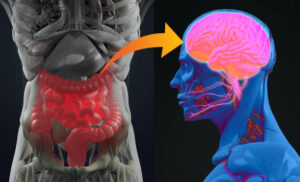Y

Are you intimate friends with your gut buddies? Those little living organisms that like to hang out in your gut. These microscopic residents find a cozy home within our digestive tract. Nestled in the walls of our intestines, they form a vibrant community known as the gut microbiome. Picture a lively neighborhood, bustling with activity and teeming with life. Well, that’s our gut!
Your gut microbiome is home to trillions of microorganisms. To take it a step further, 90% of your cellular makeup is nonhuman. These tiny microorganisms outnumber our own human cells by a ratio of around 10 to 1. Did you know, even more mindblowing, that 99% of all the genes that constitute you are in fact nonhuman? The vast majority of them form the makeup of our tiny gut mates.
These multitudinous microbes not only take residency in our gut. They also live in our mouths, on our skin, and in a cloud all around us. Full of microbes, these areas are also brimming with an array of bacteria, fungi, viruses, and more. Scientists call this fascinating and complex ecosystem the holo biome. Most misconceptions about health come from the lack of awareness of who we actually are. At least on the physical level.
What Does the Gut Microbiome Do?
This abundant habitat that is invisible to the naked eye holds remarkable capabilities. Without our microbes, we could not live and function! Did you know that they can have striking effects on your mental and physical health? Not only do they influence your behaviors and food choices but also your mood and brain health. They are masters at directing a vast array of cellular activities. For better or worse, they impact your weight, energy levels, immunity, and much more.
To dive right in, one of the more crucial roles our gut buddies play is in the digestive system. They break down carbohydrates, fiber, and other compounds into a form that our cells can use. Microbes extract nutrients and energy from the foods we eat. They aid the digestion process and ensure optimal nutrient absorption. Without this, we would be unable to sustain and nourish our cells, body, mind, and lives.
How Does Diet Affect Your Microbiome?
What we feed our gut bugs determines how healthy we are. Bad bugs feed off refined carbohydrates and processed foods. Gluten, a lectin protein found in wheat, barley, and rye can wreak havoc in the gut. Other lectins found in nightshade vegetables, legumes, as well as certain seeds and nuts can be fuel for bad bugs. These bad bugs can injure the gut lining and contribute to inflammation and weight gain. What the thing we ate also ate becomes fuel for our little gut mates. So the corn, grains, and soybeans consumed by cows or chickens can still affect us when we go to eat a burger or sandwich made from them.

Furthermore, the more variety of foods we eat, the greater our bacterial diversity. That is the vaster the array of fuels we have to offer our gut bugs, the more variety of different bugs we can nourish. With a robust array of gut bugs, the more nuanced types of support and tools our gut workers have to sustain us. Enriching their diets in turn optimizes and enriches various cellular functioning. This leads to enhanced nutrient production and absorption. And it can also result in improved mental health, immunity, and weight management.
How does the Microbiome Affect the Immune System?
As for immunity, greater microbial diversity strengthens the body’s ability to respond with resilience. Did you know that the gut is home to 70% of the body’s immune cells? Microbes in the gut train these immune cells to detect foreign invaders. The more extensive array of microbes the broader education these immune cells receive. These immune cells then become adept at distinguishing good bacteria from harmful pathogens.
Along with enhanced immunity, microbes also have a direct effect on our weight. Research shows the less diverse a person’s microbiome is, the more likely they are to gain weight. You may be familiar with this mouse experiment. Fecal microbiota got transferred from an overweight mouse to a skinny mouse. Likewise, fecal microbiota from the skinny mouse got transferred to the overweight mouse. The skinny mouse gained weight and the overweight mouse lost weight. This study on the Natural Library of Medicine highlights the microbes associated with this phenomenon. Firmicutes microbes may play a role in obesity while Bacteroidetes with weight loss.
Microbiota and Disease Development
Even more astonishing is the ability of microbes to influence disease progression. This article discusses the effects of transferring microbes from young mice to aged mice. Gut microbes from young mice got transferred to aging mice and vice versa. Inflammation markers associated with the gut-brain eye-brain axes decreased in aging mice. These inflammatory markers actually increased in young mice. This suggests intestinal microbes play a key role in modulating the inflammatory response.
Speaking of inflammation, a diverse gut microbiome helps maintain a balanced inflammatory response. Conversely, imbalances in gut bacteria can lead to chronic inflammation. Too much of certain kinds of microbes and not enough of others creates dysbiosis. This correlates with various health conditions, like inflammatory bowel disease and cardiovascular disease. It also links to autoimmune diseases and certain cancers.

Along with this, the gut microbiome also plays a role in brain health, mental well-being, and mood. The gut and brain connect via the gut-brain axis. This connection is bidirectional, like an informational highway. That is gut bugs can influence communication between the gut and brain and vice versa. These microbes produce neurotransmitters and other molecules that influence brain function. Some of these include glutamate, GABA, serotonin, and dopamine. GABA regulates and improves mood by calming the nervous system. It also helps to turn off stress reactions. Research on this has shown that a disturbed microbiome is associated with conditions like depression, anxiety, and even neurological disorders. On the other hand, the more diverse your microbiome, the lower your rate of mood disorders and mental conditions.
Gut Buddies Influence Medication
Exploring further into the world of microbes, they even affect how we use medication. Strangely enough, gut bugs can interact with various drugs. They influence their effectiveness and side effects. Certain types of gut bugs change the structure and activity of drugs. This influences how they become metabolized and absorbed into the bloodstream. In turn, affecting therapeutic outcomes for the body as a whole.

It is easy to underestimate these tiny organisms’ immense impact on our bodies and minds. Likewise, it is important to recognize how much we rely on and depend on our gut buddies. Without them, we wouldn’t be able to even make use of the food we eat. Or fight off disease. Or have a strong heart and mind. Fostering a healthy and diverse gut microbiome unlocks a world of health and vitality. So cheers to our gut buddies! Let us drive out the bad bugs partying in our gut. And let us treat the good bugs with the foods they crave. By embracing the transformative power they hold we can optimize our wellbeing. Understanding and harnessing the influence of our unspoken allies unleash a wellspring of healthy support.
